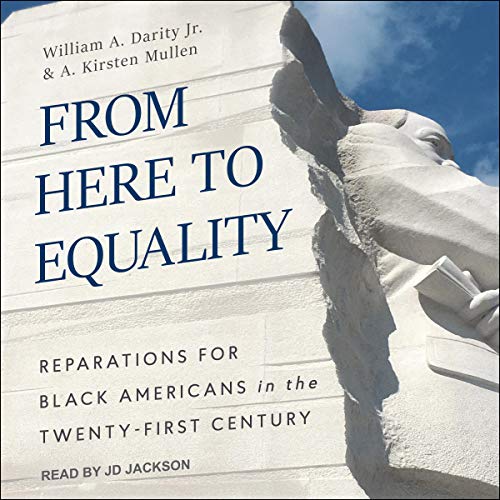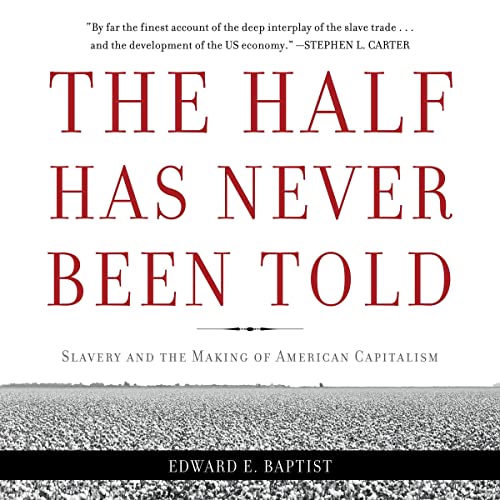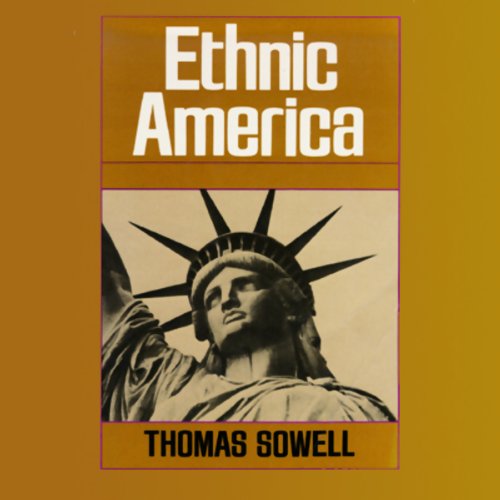

 Audible sample Playing... Paused
Audible sample Playing... Paused
3 months free
$0.00$0.00
- For a limited time, get Audible Premium Plus free for 3 months.
- You'll receive 1 credit a month to pick ANY title from our entire premium selection to keep forever (you'll use your first credit now).
- You'll also get UNLIMITED listening to select audiobooks, Audible Originals, and podcasts.
- After 3 months, $14.95/mo. Cancel online anytime.
Buy
-12% $17.46$17.46
Back of the Hiring Line: A 200-Year History of Immigration Surges, Employer Bias, and Depression of Black Wealth
 Audible Audiobook
– Unabridged
Audible Audiobook
– Unabridged
One hundred fifty years after the end of slavery and nearly 60 years after the passage of the civil rights laws of the 1960s, average Black household wealth in the 21st century remains a fraction of the median assets of other racial, ethnic, and immigrant populations.
There are many reasons, but this book is about one: two centuries of governmental encouragement of periodic sustained surges in immigration.
Governmental policies and actions have enabled employers to depress Black wages and to avoid hiring African Americans altogether.
Here is a grand sweep of the little-told stories of the struggles of freed slaves and their descendants to climb job ladders in the eras of Frederick Douglass, W.E.B. Du Bois, Marcus Garvey, A. Philip Randolph, Barbara Jordan, and other African American leaders who advocated for tight labor migration policies. It is a history of bitter disappointments and, occasionally, of great hope:
- Setback: the first European immigration surge after 1820 and the ensuing, sometimes violent, labor competition
- Hope: the post-Civil War opening of the "golden door" to Northern and Western jobs
- Setback: the Ellis Island-era great wave of immigration
- Hope: Major reductions in immigration in the mid-20th century creates a labor demand among Northern and Western industrialists so great that they aggressively recruited descendants of slavery and precipitated the Great Migration of Black Southerners
- Setback: In 1965, Congress accidentally restarts mass immigration
Looking to the future, the author finds in the past assurance that any immigration policy that helps move more Black workers into the labor force and increases their wealth accumulation will also assist struggling Hispanics and other populations of recent immigration.
- Listening Length7 hours and 9 minutes
- Audible release dateNovember 22, 2021
- LanguageEnglish
- ASINB09MDF5K6C
- VersionUnabridged
- Program TypeAudiobook
People who bought this also bought
- Audible Audiobook
- Audible Audiobook
- Audible Audiobook
- Audible Audiobook
- Audible Audiobook
Related to this topic
- Audible Audiobook
- When Affirmative Action Was White: An Untold History of Racial Inequality in Twentieth-Century America
 Audible Audiobook
Audible Audiobook - Audible Audiobook
- Audible Audiobook
- Audible Audiobook
Only from Audible
- Audible Audiobook
- Audible Audiobook
- Audible Audiobook
- Audible Audiobook
- Audible Audiobook
Product details
| Listening Length | 7 hours and 9 minutes |
|---|---|
| Author | Roy Beck |
| Narrator | Roy Beck |
| Audible.com Release Date | November 22, 2021 |
| Publisher | Roy Beck |
| Program Type | Audiobook |
| Version | Unabridged |
| Language | English |
| ASIN | B09MDF5K6C |
| Best Sellers Rank | #161,961 in Audible Books & Originals (See Top 100 in Audible Books & Originals) #122 in Emigration & Immigration Studies (Audible Books & Originals) #122 in Immigration Policy #537 in Black & African American History (Audible Books & Originals) |
Customer reviews
Customer Reviews, including Product Star Ratings help customers to learn more about the product and decide whether it is the right product for them.
To calculate the overall star rating and percentage breakdown by star, we don’t use a simple average. Instead, our system considers things like how recent a review is and if the reviewer bought the item on Amazon. It also analyzed reviews to verify trustworthiness.
Learn more how customers reviews work on AmazonReviews with images
-
Top reviews
Top reviews from the United States
There was a problem filtering reviews right now. Please try again later.
Thanks
Footnoted quotes from people ranging from Frederick Douglass to eminent economic historians:
"Jeffrey Williamson and Peter Lindert's macroeconomic history shows that between 1816 and 1856, the American Northeast was transformed from the "Jeffersonian ideal" to a society more typical of under-developed countries with marked income inequality and very low wags for laborers," to the detriment of both free Blacks and immigrants, due to mass immigration.
One of the beauties of the book is showing that this has happened repeatedly, making it much harder for proponents of mass immigration to argue that this is not what's maintaining the income and wealth gap in wealth between African Americans and Whites (Blacks have 6%(!!!) the wealth of Whites currently).
And author Roy Beck quotes Black leaders, from each of the multiple eras of mass immigration, starting with Frederick Douglass, on how mass immigration is resulting in Black wages dropping, and AFrican Americans losing jobs.
Beck notes that currently, there is an ethical choice being made by many on the left that impoverished denizens of low income countries are more deserving than the descendants of American Black slaves. I would guess that most people making this choice are ignorant of how TOO MUCH immigration has pushed Blacks back down after they'd made progress during periods of low immigration, such as the post Civil War era and the post WWII era (and a handful of other such eras).
That ethical choice may be helping the immigrants, but Beck points out that it is harming the countries they are leaving by enticing away those people who would be most likely to lead the changing of conditions in these home countries for the better.
I'm going to be giving a copy to my US Rep at the next town hall meeting, and dropping one off at my Senator's door (who lives within six miles of me), and giving copies to my high school. That's how effective I think this book will be.
Among the most jarring questions the author asks is, "Are we as a nation content to have an earnings gap that is no better than five years after the end of the Civil War?
Why have the nation's Black "leaders," e.g. the NAACP, Congressional Black Caucus, Jesse Jackson and Al Sharpton remained silent about our immigration policy that hurts most the very people they profess to care about? Where are the voices of prominent Black journalists like Clarence Page (Chicago Tribune) and Leonard Pitts Jr. (Miami Herald), both Pulitzer Prize winners?
Especially troubling is the fact that Congress during the past several decades has repeatedly ignored the recommendations of immigration reform commissions, most notably the one in the early 1990s chaired by the late Barbara Jordan, that called for reduced levels of immigration that would have helped disadvantaged Blacks and others to enter the economic mainstream. Jordan called for an immigration policy that puts the national interest first, but today's annual legal immigration level of 1.2 million people, plus the many temporary work visas issued each year, do nothing to help struggling Black Americans get their feet on what the author calls the "first rung of the economic ladder" that leads to a middle-class lifestyle.
It is all well and good to champion civil rights; but until the US comes to the realization that forcing unskilled workers - whatever their race - to compete with desperate foreign workers, many in the US illegally, is a recipe for wider inequality and poverty, we will make little progress in bringing Black workers into the mainstream in wages and wealth. Beck points this out in detail.
Until we are ready to 'cast (our) buckets down here', as advised by Booker T Washington, we will find ourselves being more divided than ever. Kind words and good intentions are merely virtue signaling unless we are willing to enforce our immigration laws and restrict massive legal immigration and end illegal immigration altogether and to do it sooner rather than later.




















